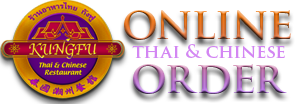
There is plenty of buzz surrounding the opening of Pok Pok in New York City, which is the Thai restaurant owned by James Beard Award-winning chef Andy Ricker. New York seems excited. It started in Portland a few years ago when Ricker decided to bring a taste of Southeast Asia (North and Northeast Thailand) to Portland.
The creations he made were surprisingly good for a non-Thai native, but maybe not surprising for someone who has studied the cuisine for 20 years in Thailand. It’s not uncommon for him to invest as much as one full year learning a single dish. And this is very likely the reason The New York Times called Ricker the ambassador for Thai food in the United States.
“It might seem unusual for a Thai restaurant owner to wish another Thai restaurant owner good luck,” said Alan Wong, general manager of Kung Fu Plaza in Las Vegas. “But Ricker is one of the few chefs who knows what he is doing with Thai food. Somehow it got in his blood and once New Yorkers taste his take on Thai food, we’re hoping it will expand their palates. Once you start to move beyond the typical dishes, everything about Thai food tastes better.”
Although Ricker is known for being brazen about his dishes, Wong says Ricker is always respectful about Thai cuisine and the Thai people. And while Ricker tends to place his restaurant above others in the United States, he’s earned the Wong family’s respect for introducing a broader Thai menu to America. He does his research, learns the dishes in Thailand, and then brings them home. Recently, Ricker even put off a cookbook until he can visit the region again.
Authentic means you preserve the recipes as they were intended.
“I like that he is not trying to claim to be authentic or attempting to introduce an Asian fusion, which is not traditional or authentic,” says Wong. “He is really trying to bring Northeastern Thai dishes to America. While the Northeast is heavily influenced by Laos, it helps to diversify the number of dishes available. But most importantly, he doesn’t mess around with the food.”
The Wong family, which moved to the United States in the 1970s and opened the first restaurant of its kind in Las Vegas, places the same emphasis on Thai food, except with dishes from Central Thailand. They frequently describe their cuisine as authentic, especially off-menu dishes, because most are family recipes brought over from Thailand.
“Much like Ricker says, the secret is to not mess with the recipes, except when you don’t have a choice because the ingredients aren’t available,” says Wong. “Likewise, I trust he understands that not all Thai restaurants are authentic in Thailand. Many of the chefs that cook in Thailand are not Thai and many more have adapted recipes for tourists. Here in the United States, it is even more confusing because many Thai restaurant owners are afraid to cook real Thai food, assuming they know how.”
Wong says that he isn’t criticizing anyone, per se. He is just stating a fact. Even the Wong family had some challenges early on.
When his family decided to retain their family recipes brought over from Thailand in the 1970s, they soon found out that Americans weren’t ready for cuisine they couldn’t recognize. But because the family wasn’t willing to alter the recipes, they did the next best thing. They placed their Thai dishes on the menu next to the Chinese dishes so many people ordered, including Mongolian beef and chow mein.
Most families aren’t willing to take such a chance, and generally try to make a menu of Americanized Thai. What the Wong family did instead was create a menu for both the expecting patron and the more adventurous. The decision paid off. After only a few years, the Plaza Hotel and Casino asked Kung Fu to become the first non-property owned restaurant in the hotel.
Today, Kung Fu Plaza has since moved from the Plaza but still serves equal amounts of Thai and Chinese dishes to walk-in guests and patrons who order food from their hotel rooms. When you consider all the resorts in their delivery service area, Kung Fu Plaza might even have the mot expansive delivery area in the United States.
“When most restaurant owners want to expand, they have to duplicate their restaurant,” said Wong. “We just wait until the next resort opens on the Las Vegas Strip.”
Wong says his family did open a second location for a brief period of time a few years ago. While the second restaurant seemed to do fine, they closed it because it did not meet the Wong family’s standards. Having a master chef on premises is the only way to ensure consistency.
“It’s not like other food, which is why most Thai cookbooks produce mixed results,” he said. “If even one ingredient is varied in maturity, flavor, or heat, it will change the entire dish. It takes years before a chef knows precisely what to do to correct it and achieve the same taste.”
Founded in 1973, Kung Fu Plaza is the oldest and most authentic Chinese and Thai restaurant in Las Vegas. It is open daily from 11 a.m. to 11 p.m. It is also the most recent of all Las Vegas restaurants to become 100% Angus Beef Certified, and the only Asian restaurant to receive this certification.
